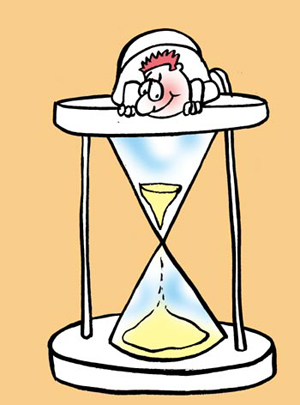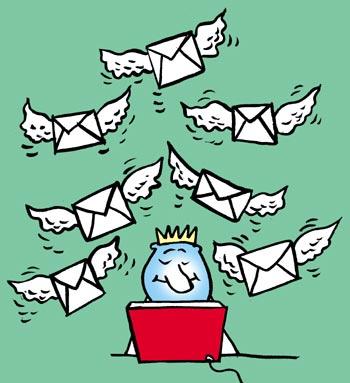
It's a new day and your raring to go. You leave home with a clear work agenda outlined for the day. You get to the office, and things don't work as smoothly. You inevitably fall prey to multiple distractions that consume your time, energy and concentration.
Phone calls, text messages, e-mail and more. Then there's the customer/ client crisis, co-workers who need your help or just want to chat or emergency meetings that disturb your schedule, traffic jams, rotational shifts. And don't forget your boss who needs updates on all the projects you're involved in.
Do you end up wishing you had 5 extra hours in a day? Here are a few pointers from young professionals on how to make the most of your work hours:
Get organised
This is the key to making your time at the office more productive. Have you ever returned from a meeting to find extra files, letters and documents all over your desk, and even on your chair? Instead of following your own schedule, you get distracted by someone else's priorities.
Rashmi Mehta, a sales director with a travel agency, states "Maintain a clearly designated "In basket" at your desk so that people do not dump files/documents on your desk randomly."
Once you have your tasks for the day figured out, check on your In basket to know what needs to be done pronto and what can wait.
"I find it helps to take print-outs of important tasks to be performed and pinning them on my softboard," says Deepesh Mathur, a marketing manager at a Mumbai-based FMCG company. "Setting reminders on your phone helps to as does maintaining an organiser or diary."
Deeksha Singh is a managing partner with WCH Training Solutions, a New Delhi-based training and consulting firm. She can be reached at deeksha@wchsolutions.com
Meetings are necessary (although often they can be quite unproductive). Planning the time and venue for the next meeting during the current one will save you time coordinating for the next. Check if your Monday morning team meeting is out of necessity or simply habit.
Un-clutter your schedule. Establish an agenda for important meetings and distribute it to all the participants a few hours before the meeting. Stay on track, start and end on time. If your presence is not essential for the entire weekly review meeting, ask your boss privately in advance if it might be appropriate for you to excuse yourself early.
Amol Kumar, a regional branch manager with a private bank, suggests "Only invite those who can contribute to at least 50 per cent of the items on the agenda and discuss sensitive issues with the key participants before the meeting. The effectiveness of a meeting diminishes with groups larger than eight to ten so watch out for group size."
Choose your tasks carefully
Make sure your work (and the time you put in) adds value to the organisation and that it makes the best use of your skills.
Ask yourself: "Will this advance my career within the company?" and "Will I able to do justice to this assignment?" before you decide to sit on a committee or take on an additional project.
You will earn a lot more respect by teaming up with a colleague whose expertise complements yours than by taking on additional work on your own, overburdening yourself and burning out.
"I like to finish the uncomplicated tasks at the beginning of the day. It saves me energy and interest for the rest of the day for tasks that will need more concentration," says Chandra Ramamurty, who works as clinical psychologist with an NGO.

This is perhaps the most cliched, yet perhaps the most important and most under-utilised.
Create and maintain a to-do list at all times and make it a habit to update it on a continuous basis. A to-do list used well can be extremely effective. In addition to scheduling and planning, make a daily to-do list that can include short-term and long-term goals. There's nothing more satisfying than crossing off another task that has been accomplished.
Nitin Raheja, a senior marketing manager with a leading real estate firm in Delhi, suggests: "Include urgent and non-urgent items so you'll never forget or overlook anything. Carry your list with you at all times and break down your projects and assignments into specific action points. For instance, instead of noting 'Prepare the sales report', write:
Prioritise your to-do items and assign each task a 1, 2 or 3 rating. Items marked '1' are important tasks that must get done right away. '2' items are important, but not as important as '1' items. '3' items are things that need to get done at some point, but there's no rush."
Nitin further adds, "Once you've assigned a rating to each task, re-write your to-do list with all the '1' items on top (in order of importance), then the '2' and '3' items. Complete the '1' items first." Reminders on the computer and phone have become a way of life at the office, but you need to stick to them for them to be effective.

This may seem obvious, but think of how many times you've put off an important (sometimes unpleasant) task so you could call a friend, chat or do something else that really didn't need to happen at that time.
"I am perceived as a workaholic because I track the time I give to friends," adds Kanika V, who works with an insurance company. "It is sometimes embarrassing but saves a lot of personal time."
Club similar activities together
Make all your phone calls at one go. Check all your e-mail at once. Transitioning from one type of activity to another takes time, so group like to-do items together and complete them at a designated time.
Don't overfill the 24 hours that you have in a day. Instead maximise them by becoming aware of how you spend your day. If you maintain a routine, create shortcuts and use your time wisely, you'll get everything done... with time to spare.